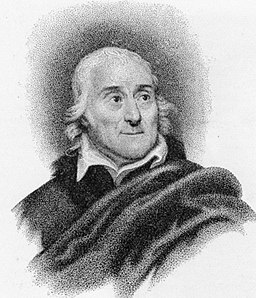
Even though da Ponte was a priest, he led a scandalous life that eventually caused him to be banished from Venice for 15 years.
Upon his banishment, da Ponte moved to Vienna, where he continued writing. Eventually, through an introductory letter from a friend, Lorenzo da Ponte obtained a position as librettist to the Italian Theatre in Vienna. It was during this tenure that da Ponte composed three librettos for Mozart. Le nozze di Figaro was written in 1786, Don Giovanni in 1787 and Cosí fan tutte was written in 1790.
As a librettist, da Ponte worked closely with the composer to bring out characterization, humor, and satire, joining the more natural theater of Comedia del’arte with the historic story-telling of the opera seria. His work was in great demand, and Mozart wrote to his father, worrying about securing da Ponte, out of fear that other composers were trying to keep him for themselves.
From npr.org:
He seems all the way through his life to have had the most extraordinary charm,” author Rodney Bolt says.
Bolt says Da Ponte helped bring Mozart’s works to life. Perhaps nowhere is that more evident than in the famous “Catalog Song” from Don Giovanni, in which the title character’s servant lists the number of women his master has seduced:
In Italy six hundred and forty / In Germany, two hundred and thirty-one. / A hundred in France, in Turkey ninety-one, / But in Spain already a thousand three.
Da Ponte seemed to know what Mozart wanted to say, Bolt says, “and the music almost comes out of the words in themselves.”
(Rodney Bolt is the author of the book,”The Librettist of Venice“)
Shortly after the death of Austrian Emperor Joseph II, da Ponte lost his position at the Italian Theater. He left Vienna after being formally dismissed in 1791, due to more scandals. da Ponte headed to Paris, but changed direction mid-route and moved instead to London. There, he remained with his companion Nancy Grahl and their children until 1805, when he and his family fled London for the United States due to debt and bankruptcy.
In the US, da Ponte first settled in New York, then Pennsylvania. He gave private Italian language lessons, and ran a grocery store, eventually returning to New York to open a book store. Lorenzo da Ponte, through a connection with a friend, became the first professor of Italian literature at Columbia College (University). Although the role was unpaid, it was significant, because he was the first Roman Catholic priest on the faculty, and the first faculty member to be born as a Jew.
da Ponte introduced opera in 1825 to New York, where the first full performance of Don Giovanni was conducted. He became a naturalized US citizen at age 79, and at age 84, he founded the New York Opera Company. The company lasted two seasons before being disbanded due to debts. In 1836 the opera house became the National Theater.
Lorenzo da Ponte also wrote for some of these composers on IPA Source:
Here, from the IPA Source database, are the three operas as set by Wolfgang Amadeus Mozart, with librettos by Lorenzo de Ponte.
Le nozze di Figaro https://www.ipasource.com/composer/m/mozart-wolfgang-amadeus-1756-1791.html?search=le-nozze-di-figaro#le-nozze-di-figaro
- Aprite un po’ quegli occhi
- Crudel! Perché finora farmi languir così
- Deh, vieni, non tardar
- Dove sono i bei momenti
- Il capro e la capretta
- In queql’anni
- L’ho perduta
- La vendetta
- Non più andrai
- Non so piu cosa son
- Porgi amor qualche ristoro
- Se vuol ballare
- Sull’aria
- Un moto di gioia
- Vedrò mentr io sospiro
- Venite inginocchiatevi
- Via resti servita, Madama brillante
- Voi, che sapete
Don Giovanni https://www.ipasource.com/composer/m/mozart-wolfgang-amadeus-1756-1791.html?search=don-giovanni#don-giovanni
- Ah taci, ingiusto core!
- Ah, fuggi il traditor
- Ah, pietà, signori miei
- Batti, batti, o bel Masetto
- Dalla sua pace
- Deh, vieni alla finestra
- Eh via, buffone
- Finch’ han del vino
- Ho capito, signor sì
- Il mio tesoro
- Là ci darem la mano
- Madamina, il catalogo è questo
- Metà di voi qua vadano
- Mi tradi quell’alma ingrata
- Non mi dir
- Notte e giorno faticar
- Or sai chi l’onore
- Vedrai, carino
Cosí fan tutte https://www.ipasource.com/composer/m/mozart-wolfgang-amadeus-1756-1791.html?search=cosi-fan-tutte#cosi-fan-tutte
- Ah scostati!… Smanie implacabili
- Ah, guarda, sorella
- Ah, lo veggio, quell’anima bella
- Come scoglio immoto resta
- Donne mie la fate a tanti
- È amore un ladroncello
- Fra gli amplessi
- In uomini, in soldati
- Non siate ritrosi
- Non son cattivo comico!… Nel mare solca
- Per pietà, ben mio
- Prenderò quel brunettino
- Rivolgete a lui lo sguardo
- Soave sia il vento
- Tradito, schernito
- Tutti accusan le donne
- Un’aura amorosa
- Una donna a quindici anni
- Vorrei dir, e cor non ho
